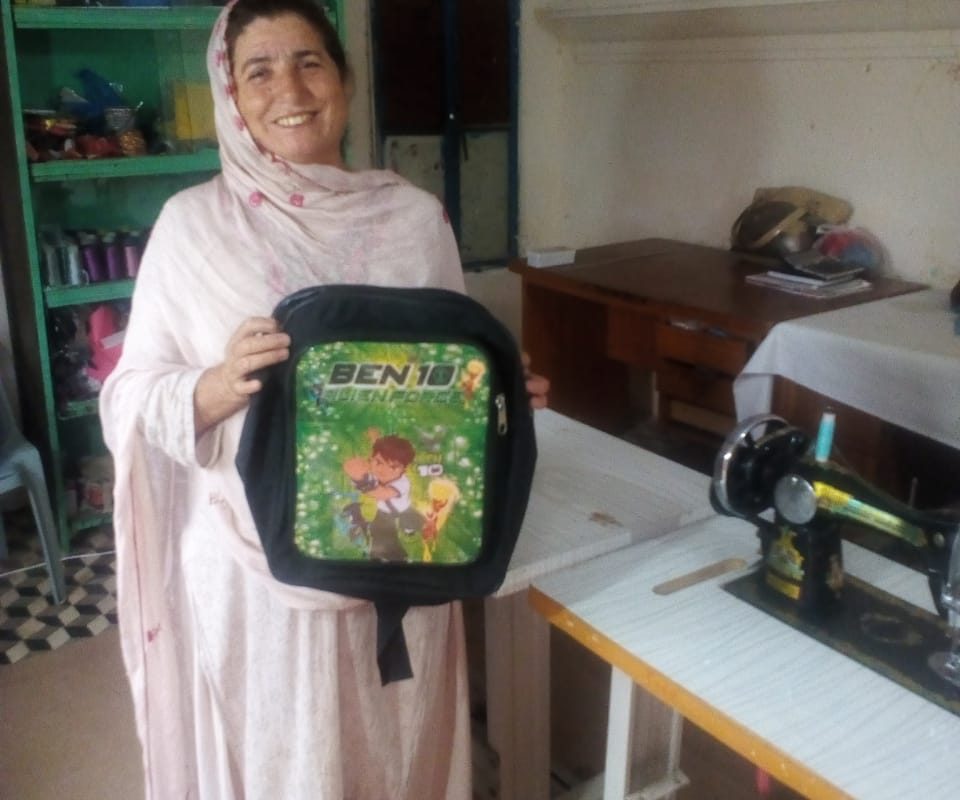
From 2010 to 2019, Hafeeza Begum and Gul Naz learned various skills in PODA’s Rural Women Artisan Center in district Chakwal in the Punjab province of Pakistan. They started with a project on recycling paper to make paper mashie items and then moved on to embroidery to make cross stitch design Key Chains and bags. After mastering these two skills PODA taught them how to make Rag Dolls with used cloth and yarn and later how to make paper bags with used poster charts and large planner papers. They also learnt how to make paper mastered all aspects of recycling, enterprise development, marketing. The project also held workshops on environmental issues and climate change developments and knowledge about the legal rights of women in Pakistan. Gul Naz also learned how to use a computer and work in word and excel programs and how to use the internet. Hafeeza concentrated more on stitching and became a master trainer in making all kinds of clothes, curtains, bed sheets, towels, bags, dolls, and bread baskets. Their products were prepared nicely with excellent finishing and they were always willing to improve and do even better. PODA also helped them to get their own bank accounts and learn financial literacy provided them opportunities to do exhibitions in Islamabad and practice their management and marketing skills. They also attended some meetings of the Chamber of Commerce and learnt about making business plans and met businesswomen.
In January 2020, PODA and two women artisans decided it was time for them to fly solo. The two women set out to start their own business as the first-ever “Stitching and Cloth Sop” by women in their rural area. Gul Naz’s husband had a cousin who left their village and his house was empty. He gave it for free for their business for one year. PODA gave them two regular sewing machines and one embroidery and pico design sewing machine and some tables, chairs, shelves, and fans. They also wanted to have a component of Shop, so the two women used their savings to buy bulk quantity thread, lace, zip, ribbon, and other accessories that are needed in making fancy clothes and started selling them at their shop. That became a popular addition and also served a big need for women and girls in the area who earlier had to go to a nearby town on public transport to get these items. After a lot of thinking they decided to name their shop “ Sui Dhaaga” that is Urdu for “Needle and Thread”. They requested PODA to make a banner for them and put it up proudly in their new shop.
They selected a location for their shop where streets of 3 villages met and it was a place where everyone passed on foot, cycles, bikes, or rickshaws. Their location proved very successful. Now the mothers in the village are requesting them to also add books, stationery, undergarments and sanitary items for girls so that they do not have to go to other towns to get necessary items. Hafeeza and Gulnaz are trying to save money for these new additions and looking for investors. Their hard work is paying off well. Not only are they able to help themselves but they were also able to help their communities during COVID 19 crisis. There were no masks in the village and the one in a nearby town also came from the big city and was very expensive. Most villagers could not afford them and needed a cheap and safe alternative. This newly formed sewing business of two energetic women took on the challenges and stitched 50 to 100 masks per day and made them available locally at one-third of the market price. PODA also helped them with training, sanitization materials for stitching tables and machines, and their hands and initial cloth supply. The villagers especially women benefitted greatly from their enterprise. Although now the prices in local markets have adjusted and more masks are available easily, most villagers still prefer their masks and continue to order matching cloth masks with dresses.
The struggle and resilience of Gul Naz and Hafeeza are extraordinary and an exemplary success story that has inspired many women and young girls in their villages and beyond. We wish them the best for their future success and we will continue to support them in their journey.


